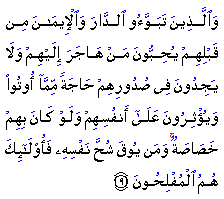Cooperation in Goodness, The Beauty of Speech, Reconciliation with God
Issue 326 » May 13, 2005 - Rabi-al-Thani 4, 1426
General
| Living the Quran |
Al-Hashr
(The Gathering)
Al-Bukhari narrated in his collection that Abu Hurairah (may Allah be pleased with him) said that a man came to the Prophet (peace be upon him) and said, "I'm exhausted and hungry." The Prophet sent to his wives asking for food to feed this man. They all replied that they had no food at all. The Prophet asked the companions around him if one of them could host this hungry, tired man. One of the Ansar volunteered. He took the hungry man with him to his house. He asked his wife, "Do we have any food to feed the guest of Allah's messenger?" "The only food we have is the children's food", the wife replied. "Try to put the children to sleep without food and bring their food for the guest", the man said. He also asked her to turn the lamp light off so the guest wouldn't notice that the hosts were not eating with him. She did so and they were able to feed the guest. The next day, the Prophet told the man that Allah was impressed with him and his wife's actions. Allah then revealed the above verse. The above is a beautiful example of cooperation in goodness between husband and wife. No doubt, both helped each other with this wonderful act of hospitality and helped each other be closer to Allah and enhance the level of their faith. When reading such examples it may seem obvious that this was the right thing for the couple to do, but when we stop and put ourselves in their shoes, it becomes evident how much they sacrificed with each act. Perhaps this can be roughly compared to a situation in our time: giving charity to the hungry and homeless. This couple sacrificed their children's dinner in order to feed their guest. The wife never protested at her husband's request. This is truly remarkable. By remembering these types of examples, when our spouses suggest that we donate money to the poor, instead of thinking about the computer we are saving up for or the vacation we would like to take, we may be able to support our spouses and ourselves in strengthening our faith. Source: |
| Understanding the Prophet's Life |
| The Beauty of Speech
The Prophet (peace be upon him) on many different occasions
prohibited his followers from exaggeration and from speaking
in an unnatural, pretensious manner, just as he forbid them
from obstinacy and affected airs. All of these tendencies distance
what we have to say from the truth and mark our words with the
taint of dishonesty and impropriety. Our words in this way lose
their ability to influence the hearts of others and instead
provoke suspicions of hypocrisy, deception, and chicanery.
The Prophet (peace be upon him) said: “The most despised of you to me and the most remote from my company on the Day of Resurrection will be the prattlers, the braggarts, and the verbose.” [Sunan al-Tirmidhi (2018)] From an Islamic perspective, true eloquence of speech avoids contrivance and pretension. Such a manner of speaking belies any notion of genuineness, while demanding a deliberate and forced effort on the part of the speaker. It indicates neither a sound disposition nor a clear literary style. Moreover, affected eloquence and verbosity, aside from sounding ugly and contrived, makes the speaker look like he wants to dupe others or at least get the better of them. Indeed, we find that the braggart or the verbose speaker only fills his mouth with words and gushes them forth out of ostentation and haughtiness, in an attempt to flaunt his eloquence. The Prophet (peace be upon him) made this clear when he was asked: “We know what prattlers and braggarts are…but who are the verbose?” To which he replied: “They are the prideful ones.” [Sunan al-Tirmidhî (2018)] Pretentious speech and the hunt for the most wild, exotic, and unfamiliar words is contrary to good literary taste and balanced literary instincts. It is as far as one can get from a beautiful or elegant style. On the other hand, showing concern for perfecting one's speech, beautifying it, and judiciously choosing one's words carefully has nothing to do with the odious practices that the Prophet (peace be upon him) has warned us against. Al-Ghazali points out this distinction in his landmark work Ihya Ulum al-Din , wherein he explains how perfecting one's speech and being precise in one's choice of words is something desirable. Along with choosing words that are elegant and beautiful, they are the essentials of eloquence. Pretence and artifice, on the other hand are loathsome, since they actually bequeath to one's speech a sense of baseness and ignobility. Source: |
| Cool Concepts! |
Reconciliation with God In broad terms "repentance" can be defined as "reconciliation with God through reconciliation with His creation". Islam further outlines various steps toward the realization of this.
Thus, while it lends hope of Allah's mercy to the penitent and rids him of the guilt complex, Islam also administers equity through corrective action and successfully curbs the growth of wrongs. These three combined (admission, regret and atonement) constitute what is known in Islam as tawbah. It is futile to look for an equivalent in other religions where, despite elaborate rituals of confession and atonement, the sinner has to live with a burden on his heart, the victim with anger and frustration, and the society without peace because of the internal conflicts that are only momentarily forgotten with the export of the conflicts to a supposed external enemy. Source: |
